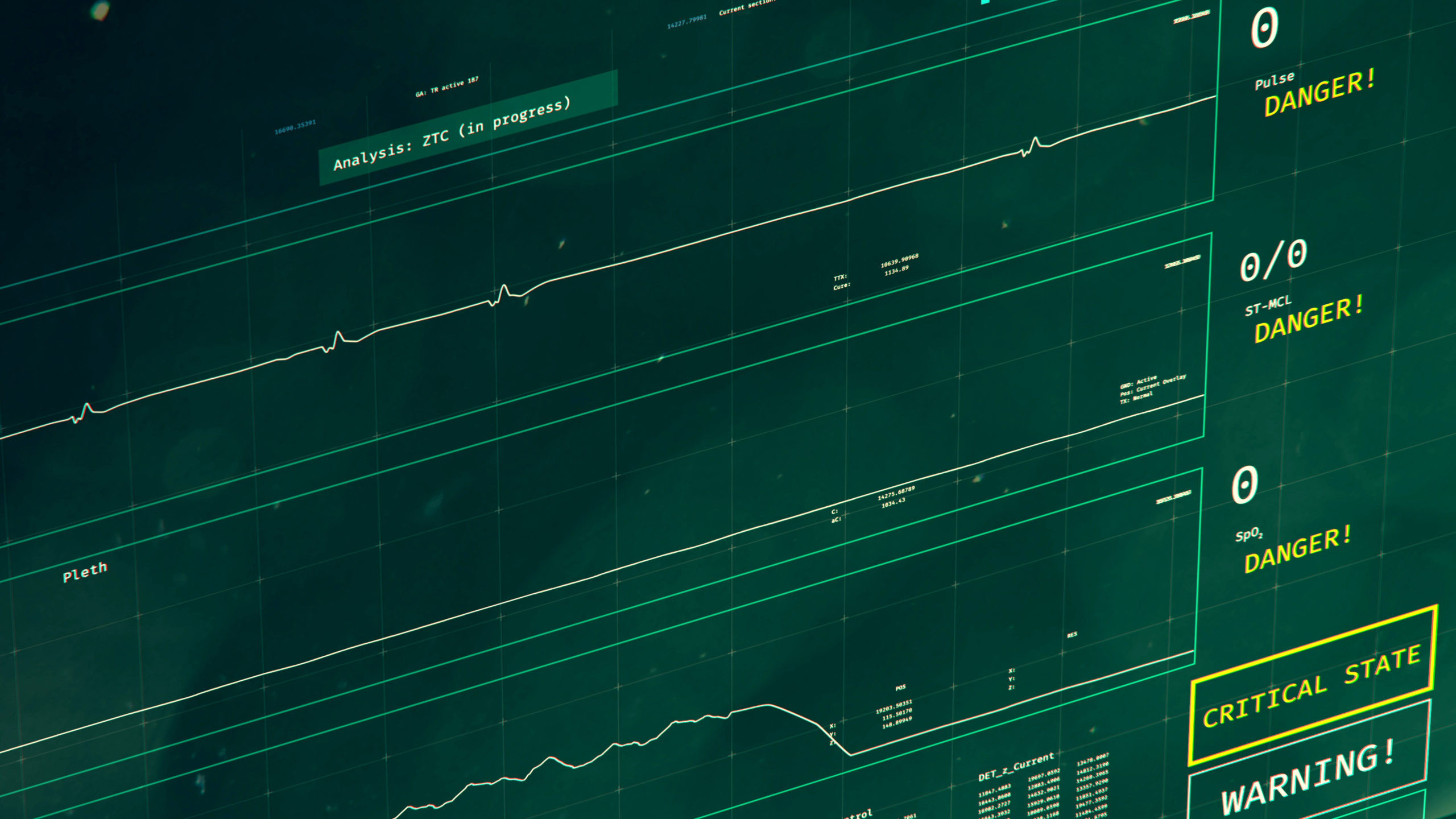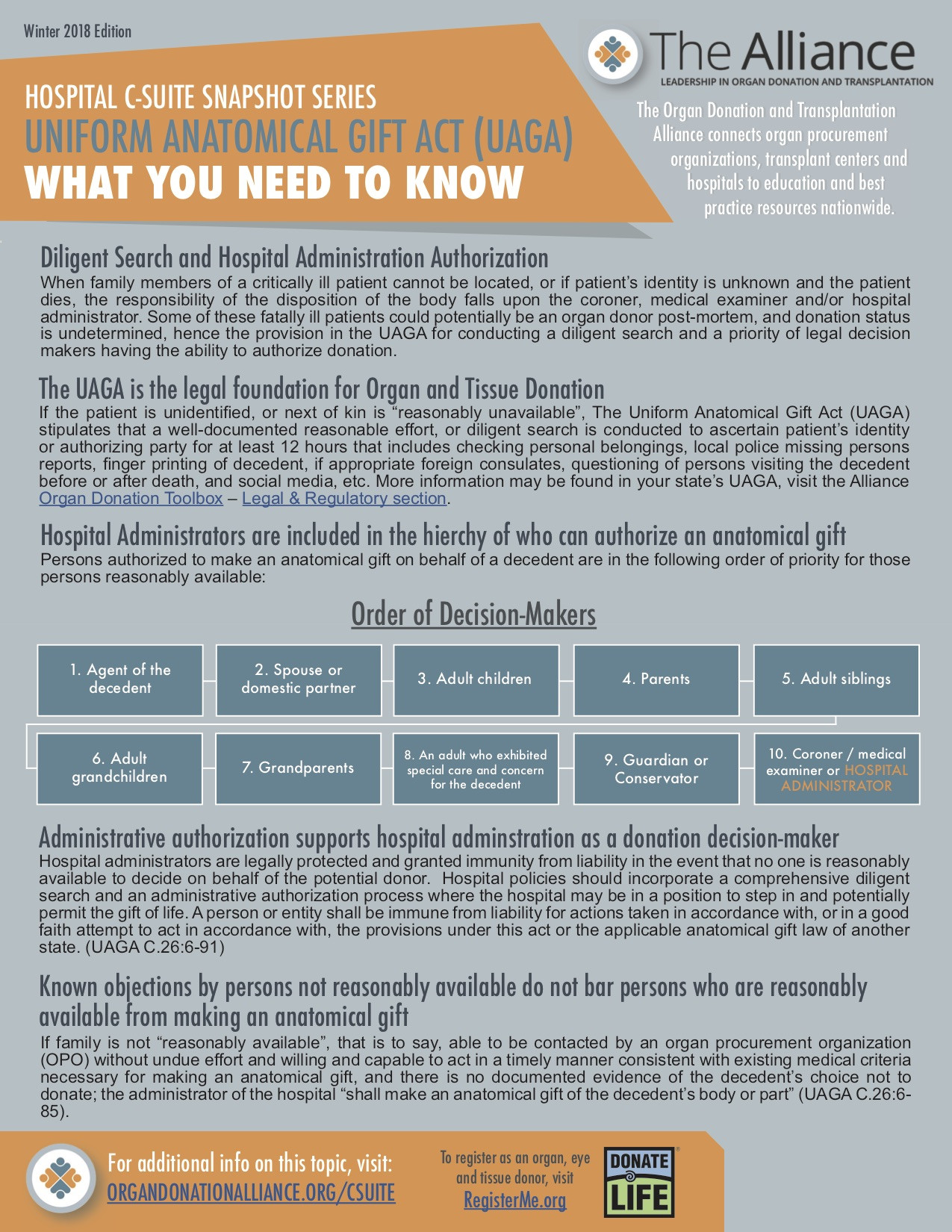 Patient Dying, Futuristic ICU Monitor With Dropping Vital Signs, Warning Message. 3D Illustration
Patient Dying, Futuristic ICU Monitor With Dropping Vital Signs, Warning Message. 3D Illustration
In situations where family members of a critically ill patient are unreachable, or when a patient’s identity is unknown and death occurs, the crucial responsibility of body disposition rests with the coroner, medical examiner, and/or hospital administrator. Within this challenging context, the Uniform Anatomical Gift Act (UAGA) plays a vital role, particularly when the deceased patient could potentially be an organ donor.
The Uniform Anatomical Gift Act: Legal Foundation for Organ and Tissue Donation
The Uniform Anatomical Gift Act (UAGA) stands as the cornerstone of the legal framework governing organ and tissue donation in the United States. Recognizing the profound need for organ transplantation and the time-sensitive nature of the donation process, the UAGA provides a clear and ethical pathway for authorizing organ and tissue donation. It addresses scenarios where a patient’s wishes regarding donation are unknown or when family members, who traditionally make healthcare decisions, are not available. This legislation is critical in ensuring that the opportunity for life-saving organ donation is not missed due to logistical or legal ambiguities, especially within the hospital setting. The UAGA aims to balance respect for individual autonomy and family rights with the societal benefit of maximizing organ donation for transplantation.
Diligent Search and Hospital Administration Authorization Under the UAGA
When a patient is unidentified or their next of kin is “reasonably unavailable,” the Uniform Anatomical Gift Act mandates a meticulously documented “diligent search” to ascertain the patient’s identity or to locate a party authorized to make donation decisions. This diligent search, as defined by the UAGA, must be conducted for at least 12 hours and encompasses several key actions. These include a thorough examination of the patient’s personal belongings for identification, checking local police missing persons reports, and, when appropriate, fingerprinting the deceased to aid in identification. Furthermore, efforts should be made to contact relevant foreign consulates if there’s reason to believe the patient is a foreign national. Questioning individuals who visited the patient before or after death, and even leveraging social media platforms, are also components of a comprehensive diligent search.
This rigorous process is crucial because, under the UAGA, if after a diligent search, no next of kin is found to be “reasonably available,” hospital administrators are explicitly included in the hierarchy of individuals authorized to make an anatomical gift. This provision acknowledges the critical role hospital administration plays in ensuring timely decisions in organ donation, especially in complex situations. For more detailed information specific to your jurisdiction, it is essential to consult your state’s UAGA, resources for which can be found at The Alliance Community Resource Toolbox – Legal & Regulatory section.
Hospital Administrators in the Hierarchy of Authorization for Anatomical Gifts
The UAGA clearly defines the order of priority for individuals authorized to make an anatomical gift on behalf of a deceased person, assuming those individuals are “reasonably available.” This hierarchy is structured to respect familial relationships while providing a clear path forward when family members cannot be located or are not available to make timely decisions.
(insert image)
Administrative Authorization Supports Hospital Administration as a Donation Decision-Maker
The inclusion of hospital administrators in the UAGA’s hierarchy of authorized decision-makers is not merely procedural; it provides crucial support and legal protection for hospital administration. Hospital administrators are legally shielded and granted immunity from liability when acting in accordance with the UAGA, or in a good faith attempt to do so, even when no family member is “reasonably available” to decide on behalf of a potential donor. This legal protection is vital, allowing administrators to proceed with facilitating organ donation without fear of legal repercussions in these challenging circumstances.
To effectively implement these provisions, hospital policies must incorporate a comprehensive diligent search protocol and a clear administrative authorization process. This ensures that the hospital is prepared to act decisively and ethically when it is in a position to potentially permit the gift of life. The UAGA (C.26:6-91) explicitly states that “A person or entity shall be immune from liability for actions taken in accordance with, or in a good faith attempt to act in accordance with, the provisions under this act or the applicable anatomical gift law of another state,” reinforcing the legal security provided to hospitals and administrators.
Defining “Reasonably Available” and Hospital Authority
The UAGA’s effectiveness hinges on the definition of “reasonably available” in the context of family members. According to the Act, “reasonably available” signifies the ability of an organ procurement organization (OPO) to contact family members without undue effort, and that these family members are willing and capable of acting in a timely manner. This timeliness is critical because organ donation must align with existing medical criteria to ensure viability and successful transplantation.
In situations where family is not “reasonably available,” and there is no documented evidence of the decedent’s explicit choice against organ donation, the UAGA (C.26:6-85) grants significant authority to the hospital administrator. In such cases, the administrator of the hospital “shall make an anatomical gift of the decedent’s body or part.” This provision underscores the UAGA’s intent to maximize opportunities for organ donation by empowering hospital administrators to act as decision-makers of last resort when family cannot be reached or are unable to act promptly. This critical aspect of the UAGA ensures that the potential for organ donation is realized, offering a chance of life to those in need of transplantation, even in the most challenging of circumstances.
Leading the Charge Helpful Resources
Questions & Comments
Please send all questions and/or feedback to [email protected].
Worth Sharing
 CSuite Snapshot Winter 2018 Corrected
CSuite Snapshot Winter 2018 Corrected
Download
A Special Thanks to This Series’ Contributors
 DD6A2041 JD Edited
DD6A2041 JD Edited
About the Editor |
Corey Bryant
Corey Bryant leads The Alliance’s communications, marketing, and strategic efforts for unique national events, programming, partnerships, and business development. With extensive experience in corporate and non-profit sectors, Corey has held communications and public relations roles with Disney Parks and Resorts, Disney Cruise Line, and TransLife (now OurLegacy), the OPO supporting East Central Florida. He has been a member of the National Advisory Council for Donate Life America and has also contributed to the board of directors of Donate Life Florida, where he acted as state team leader for Driver License Outreach and DHSMV relations. Corey is a proud graduate of The University of Alabama and actively participates in several community-based non-profit organizations in Central Florida, including serving as a past Board President of Come Out With Pride Orlando.

